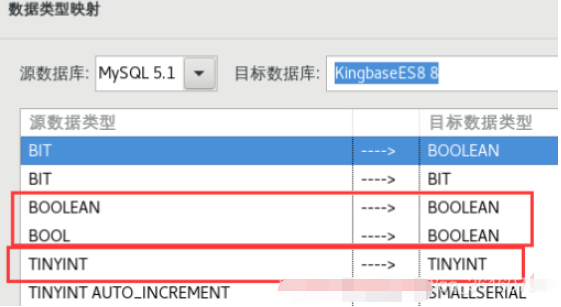How to migrate MySQL to KingbaseESV8R2
1. Use Oracle transfer
KingbaseESV8R2 only supports migration from Oracle, so migrate MySQL to Oracle first.
Problems in migrating to Oracle:
1.Oracle has a maximum 30-digit limit on table names
2.invalid hex number, invalid hexadecimal
3.Table The data is empty and it reports "cannot insert NULL into
4. The index name is too long
There are many problems when migrating MySQL to Oracle, and the adjustment is very troublesome; when Oracle migrates to Kingbase, sometimes the table migration will not work. Successful, but can be successful again after multiple attempts.
2. Use KingbaseESV8R3 transfer
After contacting Jincang technical staff, I learned that there is a new version V8R3, but it cannot be used in the production environment, it can be used for testing, and supports MySQL direct migration to V8R3.
Therefore, you need to reinstall a virtual machine. During the installation process, you cannot install R2 and R3 at the same time, and use the R3 migration tool for data migration. Please select Select All when migrating the source database to migrate settings such as views, indexes, foreign keys, and default values.

Problems in migrating to V8R3:
1.tinyint(1) is mapped to boolean after migration, even if it has been mapped in the migration tool, but still the same.
So after migration, you need to change the table field type. If there is a default value, you must also change the default value.

Although the annotation has been selected during the migration process, the default value is used. Object Manager still cannot display comments for fields. Hover the mouse on the table name to view the comments on the table. No way to view it yet.
After modifying the tinyint(1) problem, you can select the database in the R3 object manager for logical backup.
Then use R2’s object manager to perform logical restoration.
3. Other questions
1.Auto-increment
MySQL auto-increment is different from Kingbase auto-increment; Kingbase auto-increment is the same as Oracle, both are implemented by defining a sequence. .
If we currently use kingbaseV8R3 for transfer, migrating mysql to r3 will help us create the sequence and fill in the default values of the fields to achieve auto-increment.
The following is the manual way to use auto-increment:
Create a SEQUENCE first, name it test_id_SEQ, set the starting value here to 101
CREATE SEQUENCE test_id_SEQ START 101;
and then add fields that require auto-increment After adding
NEXTVAL('test_id_SEQ'::REGCLASS)
to the default value and using the insert statement, the field ID of the test table will start to increase from 101
INSERT INTO test (name) values('1');
Before deleting the sequence, you need to delete the default value in the field. Delete the sequence
DROP SEQUENCE test_id_SEQ
2.uuid
kingbase does not have a uuid function, and the execution error
select replace(uuid(), '-', '') as id from dual
is replaced by
select SYS_GUID_NAME() as id from dual;
for the time being. After all, the uuid of mysql and kingbase Different generation rules
4. Discovered SQL problems
1.Cannot use `distinguishing keyword
2.Function IFNULL changes to NVL
3. All fields need to be displayed in group by
4.sql cannot appear!='', no error will be reported, but the execution result is null. In Kingbase, an empty string is equivalent to null
5. The function IF is changed to NVL2. Kingbase can only judge whether it is null
6. The field type is string but the time is stored, and I want to format the time. You need to convert the time to a timestamp first, and then format it into a string
SELECT to_char(to_timestamp('2020-02-20 15:35:44', 'YYYY-MM-DD HH24:MI:SS'),'MM-DD')
7. You cannot use double quotes "", use single quotes '' instead of
8. Cannot use count('')
9. Time formatting, addition and subtraction
limit_time = limit_time (now() - apply_time)
MySQL:
limit_time = date_add( limit_time, INTERVAL ( SELECT TimeStampDiff( DAY, now(), apply_time ) ) + 1 DAY )
Kingbase: The trouble lies in the conversion of time and string. First format the timestamp into a string, and then convert the time back to add or subtract
limit_time = limit_time + (to_date(to_char(now(),'YYYY-MM-DD'),'YYYY-MM-DD') - to_date(to_char(apply_time,'YYYY-MM-DD'),'YYYY-MM-DD') + integer '1')
10. The table name and the system view may have the same name, so add schema name. Table name to distinguish
11. Change is_delete = false to is_delete = 0. If the field value is 0, false cannot be used. filter
The above is the detailed content of How to migrate MySQL to KingbaseESV8R2. For more information, please follow other related articles on the PHP Chinese website!

Hot AI Tools

Undresser.AI Undress
AI-powered app for creating realistic nude photos

AI Clothes Remover
Online AI tool for removing clothes from photos.

Undress AI Tool
Undress images for free

Clothoff.io
AI clothes remover

AI Hentai Generator
Generate AI Hentai for free.

Hot Article

Hot Tools

Notepad++7.3.1
Easy-to-use and free code editor

SublimeText3 Chinese version
Chinese version, very easy to use

Zend Studio 13.0.1
Powerful PHP integrated development environment

Dreamweaver CS6
Visual web development tools

SublimeText3 Mac version
God-level code editing software (SublimeText3)

Hot Topics
 1386
1386
 52
52
 MySQL: Simple Concepts for Easy Learning
Apr 10, 2025 am 09:29 AM
MySQL: Simple Concepts for Easy Learning
Apr 10, 2025 am 09:29 AM
MySQL is an open source relational database management system. 1) Create database and tables: Use the CREATEDATABASE and CREATETABLE commands. 2) Basic operations: INSERT, UPDATE, DELETE and SELECT. 3) Advanced operations: JOIN, subquery and transaction processing. 4) Debugging skills: Check syntax, data type and permissions. 5) Optimization suggestions: Use indexes, avoid SELECT* and use transactions.
 How to open phpmyadmin
Apr 10, 2025 pm 10:51 PM
How to open phpmyadmin
Apr 10, 2025 pm 10:51 PM
You can open phpMyAdmin through the following steps: 1. Log in to the website control panel; 2. Find and click the phpMyAdmin icon; 3. Enter MySQL credentials; 4. Click "Login".
 MySQL: An Introduction to the World's Most Popular Database
Apr 12, 2025 am 12:18 AM
MySQL: An Introduction to the World's Most Popular Database
Apr 12, 2025 am 12:18 AM
MySQL is an open source relational database management system, mainly used to store and retrieve data quickly and reliably. Its working principle includes client requests, query resolution, execution of queries and return results. Examples of usage include creating tables, inserting and querying data, and advanced features such as JOIN operations. Common errors involve SQL syntax, data types, and permissions, and optimization suggestions include the use of indexes, optimized queries, and partitioning of tables.
 Why Use MySQL? Benefits and Advantages
Apr 12, 2025 am 12:17 AM
Why Use MySQL? Benefits and Advantages
Apr 12, 2025 am 12:17 AM
MySQL is chosen for its performance, reliability, ease of use, and community support. 1.MySQL provides efficient data storage and retrieval functions, supporting multiple data types and advanced query operations. 2. Adopt client-server architecture and multiple storage engines to support transaction and query optimization. 3. Easy to use, supports a variety of operating systems and programming languages. 4. Have strong community support and provide rich resources and solutions.
 How to use single threaded redis
Apr 10, 2025 pm 07:12 PM
How to use single threaded redis
Apr 10, 2025 pm 07:12 PM
Redis uses a single threaded architecture to provide high performance, simplicity, and consistency. It utilizes I/O multiplexing, event loops, non-blocking I/O, and shared memory to improve concurrency, but with limitations of concurrency limitations, single point of failure, and unsuitable for write-intensive workloads.
 MySQL and SQL: Essential Skills for Developers
Apr 10, 2025 am 09:30 AM
MySQL and SQL: Essential Skills for Developers
Apr 10, 2025 am 09:30 AM
MySQL and SQL are essential skills for developers. 1.MySQL is an open source relational database management system, and SQL is the standard language used to manage and operate databases. 2.MySQL supports multiple storage engines through efficient data storage and retrieval functions, and SQL completes complex data operations through simple statements. 3. Examples of usage include basic queries and advanced queries, such as filtering and sorting by condition. 4. Common errors include syntax errors and performance issues, which can be optimized by checking SQL statements and using EXPLAIN commands. 5. Performance optimization techniques include using indexes, avoiding full table scanning, optimizing JOIN operations and improving code readability.
 MySQL's Place: Databases and Programming
Apr 13, 2025 am 12:18 AM
MySQL's Place: Databases and Programming
Apr 13, 2025 am 12:18 AM
MySQL's position in databases and programming is very important. It is an open source relational database management system that is widely used in various application scenarios. 1) MySQL provides efficient data storage, organization and retrieval functions, supporting Web, mobile and enterprise-level systems. 2) It uses a client-server architecture, supports multiple storage engines and index optimization. 3) Basic usages include creating tables and inserting data, and advanced usages involve multi-table JOINs and complex queries. 4) Frequently asked questions such as SQL syntax errors and performance issues can be debugged through the EXPLAIN command and slow query log. 5) Performance optimization methods include rational use of indexes, optimized query and use of caches. Best practices include using transactions and PreparedStatemen
 Monitor Redis Droplet with Redis Exporter Service
Apr 10, 2025 pm 01:36 PM
Monitor Redis Droplet with Redis Exporter Service
Apr 10, 2025 pm 01:36 PM
Effective monitoring of Redis databases is critical to maintaining optimal performance, identifying potential bottlenecks, and ensuring overall system reliability. Redis Exporter Service is a powerful utility designed to monitor Redis databases using Prometheus. This tutorial will guide you through the complete setup and configuration of Redis Exporter Service, ensuring you seamlessly build monitoring solutions. By studying this tutorial, you will achieve fully operational monitoring settings




